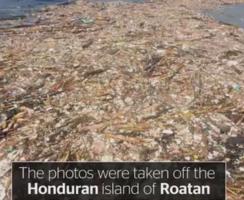
Photo: Caroline Power Photography
I was recently shocked and disturbed to see photos of a significant quantity of floating plastics and trash in the Caribbean near the Honduran Island of Roatán. Roatán is the largest of the Bay Islands of Honduras. It is a beautiful island with incredible diving. My family enjoyed a memorable diving vacation on the island a few years ago.
We have been writing about the Great Pacific Garbage Patch on this blog for years. Like the other oceanic garbage patches in the Atlantic and the Indian Ocean, the circular swirl of the currents makes for a vast and nasty conglomeration of plastic and other industrial wastes in what had, not so long ago, been a pristine ocean. One difficulty with addressing the various oceanic garbage patches is that they are so large and, in most cases so far away, that they can seem almost abstract.
Seeing the photos of garbage in the water off Roatan is different. From the Atlantic coast, the mid-Pacific seems to be a very long way away. While Roatan is not exactly close by, it is not quite so distant and it is a place where my family has gone diving. I recall the clear waters, beautiful coral reef and the teaming brilliantly colored fish. it is gut-wrenching to the floating trash fields so close to such a lovely island.
The UK’s Independent reports that the Blue Planet Society, a pressure group which campaigns to save the world’s oceans, has suggested the plastic may have originated from the Montagua river in Guatemala. Recent footage captured a torrent of waste being carried out to sea from its mouth.
Here is a short video I shot of diving on the Prince Albert Wreck off Coco View Resort, Roatan, Honduras.

While many countries used waterways and the ocean as a dump, the world’s worsening storms have gone unmentioned. The use of plastics in building material along coastal areas is common as it doesn’t rot. Hurricanes, cyclones means all that material and the contents of the homes and buildings ends up in the ocean. Like US tornadoes that carry debris and peoples belongings for miles, sometimes over 50 miles, hurricanes and cyclones do the same. Dumping needs to stop. We also need to find a way to clean up these debris fields from storms.
it should be a way for solution,must of the garbage and plastic bottles drifted away from rivers on main land of Honduras.
I expect the lawyers are growing richer arguing over who’s responsibility it is to pay for the clean up.